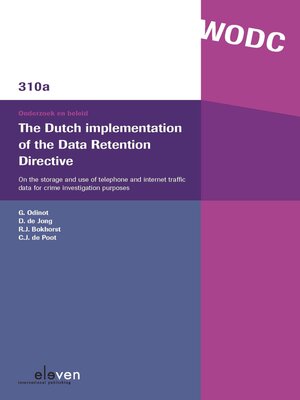The Dutch Implementation of the Data Retention Directive
ebook ∣ On the Storage and Use of Telephone and Internet Traffic Data for Crime Investigation Purposes
By G. Odinot

Sign up to save your library
With an OverDrive account, you can save your favorite libraries for at-a-glance information about availability. Find out more about OverDrive accounts.
Find this title in Libby, the library reading app by OverDrive.



Search for a digital library with this title
Title found at these libraries:
| Library Name | Distance |
|---|---|
| Loading... |
This report shows how the Dutch Data Retention Act works in practice, providing an overview of the way in which the Act is structured, and of the use of the retained telephone and internet traffic data in investigative practice. The report also provides insight into the use and value of these data in court rulings. The main assumption behind the Act is that certain telephone and internet traffic data can play an important role in the investigation and prosecution of serious crimes. However, the fact that these privacy sensitive data have to be stored for a certain period of time is a continual source of discussion. Due to the rise of mobile phone and smartphone use, and because of the many communication possibilities provided by the Internet, distance communication has changed drastically in recent years. Given the international nature of many forms of crime, European harmonization on retention periods and the retrieval of data is desirable. European harmonization does not, however, resolve all the possible challenges presented by the virtual world. The search for an alternative to the current data retention is a hefty challenge. The insights offered will be useful in discussions concerning these developments. [Subject: Communication Technology, Criminology, Dutch Law]







